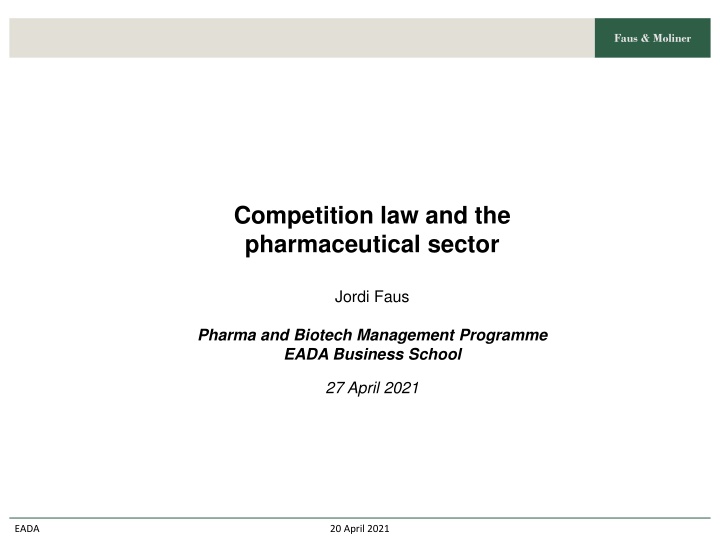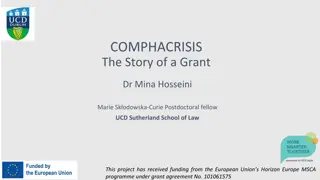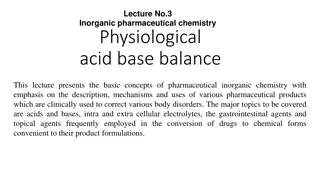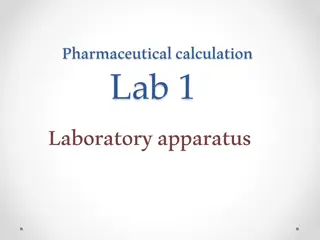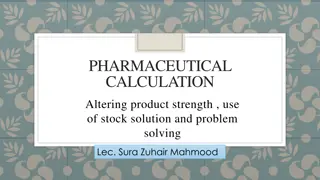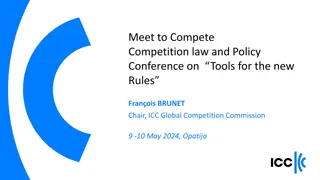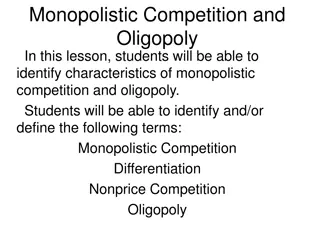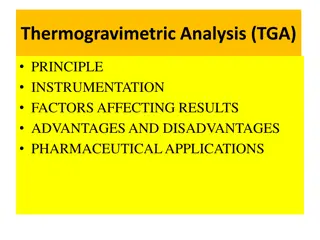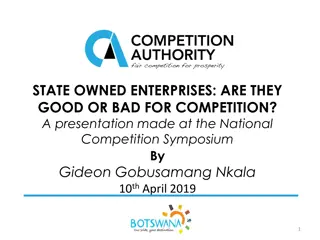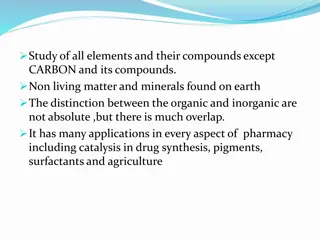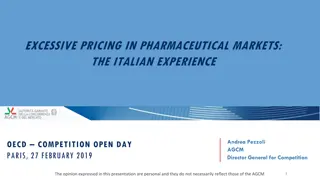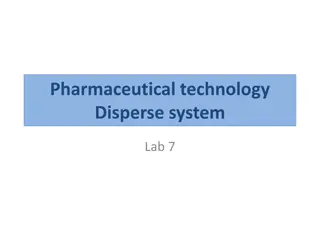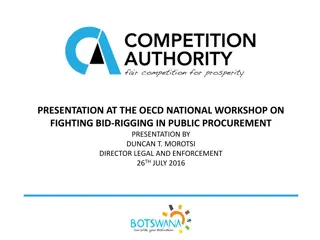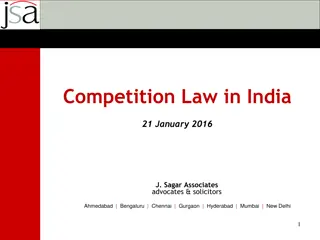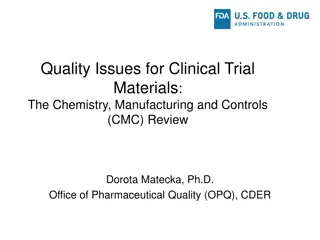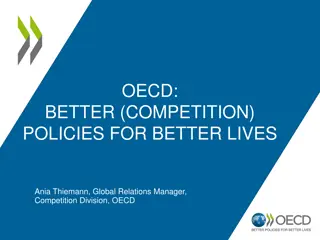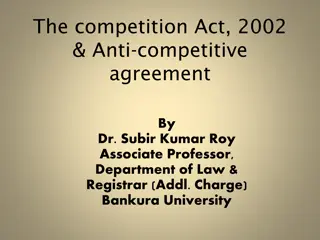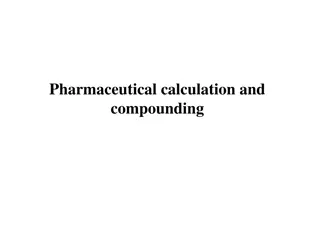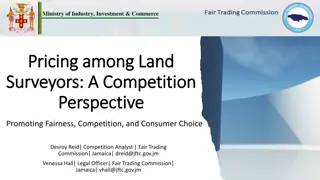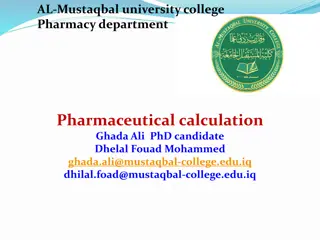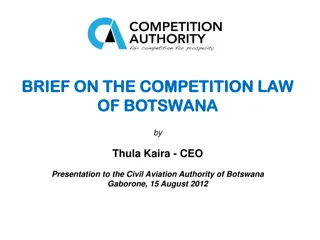Competition law and the pharmaceutical sector
This content discusses the impact of bid rigging and collusion in public procurement processes within the pharmaceutical sector, highlighting the consequences and the importance of addressing collusion to ensure fair competition. It also presents tools and examples to detect collusion, along with a case study of fines imposed on pharmaceutical producers in Spain for forming a cartel.
Download Presentation

Please find below an Image/Link to download the presentation.
The content on the website is provided AS IS for your information and personal use only. It may not be sold, licensed, or shared on other websites without obtaining consent from the author.If you encounter any issues during the download, it is possible that the publisher has removed the file from their server.
You are allowed to download the files provided on this website for personal or commercial use, subject to the condition that they are used lawfully. All files are the property of their respective owners.
The content on the website is provided AS IS for your information and personal use only. It may not be sold, licensed, or shared on other websites without obtaining consent from the author.
E N D
Presentation Transcript
Faus & Moliner Competition law and the pharmaceutical sector Jordi Faus Pharma and Biotech Management Programme EADA Business School 27 April 2021 EADA 20 April 2021
Faus & Moliner Public procurement and competition Process by which public authorities, such as government departments or local authorities, purchase goods or services from companies. Bid rigging illegal agreements between economic operators, with the aim of distorting competition in award procedures. Examples: - - - Fixing the content of the tender (price). Refraining from submitting an offer. Allocating the market based on geography. Consequences: - Estimate is that is results in overpricing / overcost circa 60%. - Damaging effect on companies seeking or needing to develop their business, especially small and medium enterprises. EADA 20 April 2021
Faus & Moliner Public procurement and competition EU Commission Notice on tools to fight collusion in public procurement (18.3.2021). - Collusion is a recurring phenomenon in public procurement markets. - Very difficult to detect. - In many (if not most) cases, collusion goes undetected during the award procedure and is ultimately uncovered and prosecuted usually long after the contract has been fully performed. - Public procurement markets have specific characteristics - contracting authorities usually follow relatively stable purchasing patterns. - New tools are needed to fight collusion. EADA 20 April 2021
Faus & Moliner Public procurement and competition - Important to address collusion before the contract is awarded. - Tools: 1. Supporting Member States and contracting authorities in building capacity to address the problem: Improve market knowledge, adapt procedures to encourage maximum participation. 2. Fostering cooperation with competition authorities: Promoting leniency programs. 3. Improve legislation: If contracting authority has sufficiently plausible indications to conclude that the economic operator has entered into illegal collusion, it may exclude it from the tender (Directive 2014/18). EADA 20 April 2021
Faus & Moliner Public procurement and competition What may sufficiently plausible indications mean? Some examples of red-flags : - Market behaviour of companies participating in tenders (i.e. companies who bid only in certain regions); - The text of the tender offer (i.e. same typos or phrases); - Prices offered in the process (i.e. excessively high or low prices); - Administrative details (i.e. tender offers submitted by the same business representative). EADA 20 April 2021
Faus & Moliner Public procurement and competition Spanish case - S/0644/18 RADIOF RMACOS (2.02.2021) The CNMC fines the two main pharmaceutical producers of PET radiopharmaceuticals in Spain for 5.76 million. Radiopharmaceuticals are used in nuclear medicine tests to detect and monitor diseases such as cancer. CNMC claims companies formed a cartel for at least four years. CNMC is also fining two of their executives as directly responsible for the offence. EADA 20 April 2021
Faus & Moliner Public procurement and competition Spanish case - S/0644/18 RADIOF RMACOS (2.02.2021) How does the ratiopharmaceutical market work EADA 20 April 2021
Faus & Moliner Public procurement and competition Spanish case - S/0644/18 RADIOF RMACOS (2.02.2021) What the CNMC ruling says: Subcontracting agreements In hospitals subject to more competition, the company better positioned to supply the radiopharmaceutical due to proximity did not submit the best bid. - As a result, the company with the cyclotrons furthest from the hospital was awarded the contract at a higher price. - The successful bidder subcontracted the service to its competitor (which has the closest cyclotron) at a price significantly lower than that charged to the hospitals. - Exclusive customer allocation - Noncompetition agreement in many centres in Spain - self-exclusions from bidding (by not submitting one or by making mistakes in the bidding process) or by submitting bids only at the maximum price. EADA 20 April 2021
Faus & Moliner Public procurement and competition Spanish case - S/0644/18 RADIOF RMACOS (2.02.2021) Fines for companies and executives Advanced Accelerator Applications Ib rica, S.L.U. (AAA): 1,523,421 Curium Pharma Spain, S.A.: 4,244,584 Mr. Giovanni Tesoriere: 46,000 Mr. Andr s P rez Boada: 46,000 Also Initiate procedure to determine duration and scope of a prohibition to participate in future tenders. EADA 20 April 2021
Faus & Moliner Market power and market definition When a firm has (or may have via a merger) market power, competition law may need to act. When does "market power" exist? How do we define "market power"? Definition linked to the possibility of profitably raise prices over a period of time, limit output, suppress innovation, etc in a given market. How do we define the market?. EU Commission s Notice on the Definition of the Relevant Market: Identify actual competitors / products capable of constraining a firm's behaviour and of preventing it from behaving independently of effective competitive pressure. EADA 20 April 2021
Faus & Moliner Market Definition and Pharma Sector Two key elements: Relevant product market and Relevant geographic market 1. Relevant product market - 1st test = interchangeability from the point of view of the prescriber (General Court in the 2018 Servier case). - 2nd test = Which other products exert significant competitive pressure on the investigated product. - What elements should we consider? - - - - - Efficacy Safety Patient comfort Cost Investments made in order to compete? EADA 20 April 2021
Faus & Moliner Market Definition and Pharma Sector - ATC Classification (Anatomical Therapeutical) devised by the European Pharmaceutical Marketing Research Association ("EphMRA"). - Usually ATC3 classification (therapeutic indication) but other ATC levels may be also considered. - ATC4 level, on the basis of equivalent active pharmaceutical ingredients (molecule level). - Do you think market definition may be dynamic? When should we consider the point of view of the pharmacist rather than the one of the prescriber? 2. Relevant geographic market - Sufficiently homogeneous area from which significant competitive pressure is exerted. - Usually national level. EADA 20 April 2021
Faus & Moliner Market Definition and Pharma Sector Servier case. Commission Decision C(2014) 4955 final, 9 July 2014 Servier infringed Article 102 by devising and implementing an exclusionary strategy covering the perindopril formulation market. Fine 41.270.000 Eur General Court, (T-691-14) 2018 Disagrees with market definition and annuls fine. Final ruling by the ECJ pending. EADA 20 April 2021
Faus & Moliner Abuse of dominant position Art. 102 TFEU DOMINANT POSITION AND MARKET SHARES 50% Presumption of dominance. 40% May be found to hold a dominant position. 40% Unlikely to be dominant, however, it is not a safe harbour. 30% Pretty safe. EADA 20 April 2021
Faus & Moliner Abuse of dominant position Art. 102 TFEU Unilateral acts of dominant firms may infringe Art. 102 TFEU. Examples: - - Imposing unfair purchase or selling prices or unfair trading conditions. Limiting production, markets, or technical development to the prejudice of consumers. Applying dissimilar conditions to equivalent transactions. - Controversy with 102 TFEU cases Competition law should not be used to protect competitors: - Sperior efficiency should be applauded, or at least not be condemned. - When a firm is being efficient and when it is being abusive? - Need of a more economic-based approach considering impact on competition, not on competitors. EADA 20 April 2021
Faus & Moliner Abuse of dominant position Art. 102 TFEU ARE THERE PER SE RULES? Historically, some practices have appeared to be unlawful per se: - Michelin v Commission (T-203/01) 2003 a loyalty rebate which is granted in return for an undertaking by the customer to obtain his stock exclusively or almost exclusively from an undertaking in a dominant position, is contrary to 102 TFEU . It may be inferred generally from the case law that any loyalty-inducing rebate system applied by an undertaking in a dominant position has foreclosure effects prohibited by Art. 102 TFEU" - Tomra v Commission (T-155/06) 2010 Seemed to regard fidelity discounts and exclusive agreements under consideration as unlawful per se. EADA 20 April 2021
Faus & Moliner Abuse of dominant position Art. 102 TFEU ARE THERE PER SE RULES? Trend towards effect analysis under Art. 102 TFEU, both by the EU Commission and by the Courts. Guidelines on Art. 102 Enforcement Priorities 2009 The EC will adopt an effect-based approach. Recent case law does require effects analysis: - Deutsche Telekom v Commission (C-280/08) 2010, TeliaSonera (C-52/09) 2011 In order to establish whether a conduct is abusive, it must have as anti-competitive effects on the market. Art. 102 protects as-efficient competitors, rather than competitors as such. EADA 20 April 2021
Faus & Moliner Abuse of dominant position Art. 102 TFEU MAY ABUSES BE OBJECTIVELY JUSTIFIED? There is no 102.3 , like in 101 cases. The EC and EU Courts came to recognise that there was some conduct that, although presumptively abusive, in fact did not amount to a violation of Art. 102 because it had an objective justification . Example: - Post Danmark (C-209/10) 2012 The Court was empathic that a dominant firm may seek to justify behaviour that would otherwise be caught by Art. 102, if its behaviour is objectively necessary or if exclusionary effects are counterbalanced by advantages in terms of efficiency that also benefit consumers. EADA 20 April 2021
Faus & Moliner Abuse of dominant position Art. 102 TFEU EXCLUSIVE DEALING AGREEMENTS AND FIDELITY DISCOUNTS A customer is required to purchase all or most of a particular type of goods or services only from a dominant supplier. Applies to both de facto as well as contractual exclusivity. Types of rebates: - Quantity rebates- linked to the volume of sales (presumptively lawful). - Exclusively rebates- conditional on customers buying only from the dominant firm (presumptively unlawful unless objectively justified). - Third category rebates- others which may have the same effect as exclusivity rebates (i.e. to set targets). These may be unlawful, depending on circumstances. EADA 20 April 2021
Faus & Moliner Abuse of dominant position Art. 102 TFEU SOME PRACTICAL TIPS ON REBATES AND FIDELITY DISCOUNTS Linear discount or step system? Better terms from unit one or better terms after reaching treshold. Timing issues. EADA 20 April 2021
Faus & Moliner Abuse of dominant position Art. 102 TFEU TYING I will only supply Alfa (the tying product) if you also buy Beta (the tied product) from me. Dominant firm for Alfa wishes to extend market power to Beta market. Dominant firm may claim that Alfa + Beta are only one product. Do Alfa and Beta have some connection by their nature or according to commercial usage? Will consumers buy Alfa without buying Beta from the same firm? Burden of proof on the Commission or claimant. EADA 20 April 2021
Faus & Moliner Abuse of dominant position Art. 102 TFEU TYING EXAMPLES Tetra Park Case (T-83/91, C-333/94) 1996 - Tetra Park required customers to whom it supplied liquid packaging machines to purchase cartons from it and to contact repair and maintenance from it. - Tetra Park argued that it supplied an integrated distribution system for liquid and semi- liquid foods and could not therefore be guilty of abuse. - Commission said it was not customary to tie cartons to machines and concluded that the cartons formed a separate market upon which the dominant firm was trying to eliminate competition. Microsoft Case (T-201/04) 2007 - The Commission found that Microsoft had tied Media Player to its personal computer operating system. - The GCourt agreed the operating software system and the Media Player were different products. Users who find that Media Player is pre-installed on their operating systems would be less likely to make use different alternatives. EADA 20 April 2021
Faus & Moliner Abuse of dominant position Art. 102 TFEU BUNDLING A firm sells two or more products together as a bundle and offers more attractive prices for the bundle than for the constituent parts of it. May have the same effect as tie-in agreements. La Poste Case (COMP/37.859) 2001: - The Commission imposed a fine of Euro 2.5 million on the Belgian Post Office for offering lower prices to customers in the market for the delivery of letters if they also made use of a separate B2B service that it provided. Hoffmann-La Roche v Commission (C-85/76) 1979: - The Court of Justice condemned rebates which were offered to customers who acquired the whole range of vitamins. EADA 20 April 2021
Faus & Moliner Abuse of dominant position Art. 102 TFEU REFUSAL TO SUPPLY A refusal on the part of a dominant firm to supply goods or services can amount to an abuse of dominant position. Commercial Solvents v Commission Case (Joined cases 6 and 7-73) 1974: - Zoja was an Italian producer of a drug used for tuberculosis; it was dependent upon suppliers of a raw material (amino-butanol), the dominant supplier of which was Commercial Solvents. - Commercial Solvents refused to supply amino-butanol to Zoja. - At the same time, its own subsidiary, ICI, entered the downstream market for the anti-TB drug. - The Commission and the ECJ decided that abuse of dominant position existed since refusal to supply would eliminate Zoja (the competitor) from the downstream market. EADA 20 April 2021
Faus & Moliner Abuse of dominant position Art. 102 TFEU PREDATORY PRICING A dominant firm deliberately reduces prices to a loss-making level when faced with competition from existing competitor or a new entrant to the market. Once competition is eliminated, the dominant firm raises its prices again. Price below AVC is presumed abusive, unless objective justification. Price below ATC (and above AVC) are predatory if intent is shown - ( must be regarded as abusive if part of a plan to eliminate competitors ), unless objective justification. AKZO v Commission Case (C-62/86) 1991: - AKZO produced benzoyl peroxide, for use within the plastics sector. ECS, decided to expand, capturing one of AKZO S largest clients. - AKZO offered flour additives at below-cost prices to damage ECS' viability. - EC imposed fine Eur 10 million on AKZO for predatory price cutting. EADA 20 April 2021
Faus & Moliner Competition Law and Covid-19 Joint statement by the European Competition Network (ECN) in March 2020 Competition law, as well as its objectives and basic principles, remain totally in force despite the exceptional nature of the crisis. Cooperation agreements aimed to ensure the supply of essential products must be assessed in view of the specific current circumstances. Action will not be taken for temporary arrangements aiming to secure supplies. ECN determined to take action against companies taking advantage of the current situation by cartelizing or abusing their dominant position. Spain: covid.competencia@cnmc.es EADA 20 April 2021
Faus & Moliner Thank you! EADA 20 April 2021
